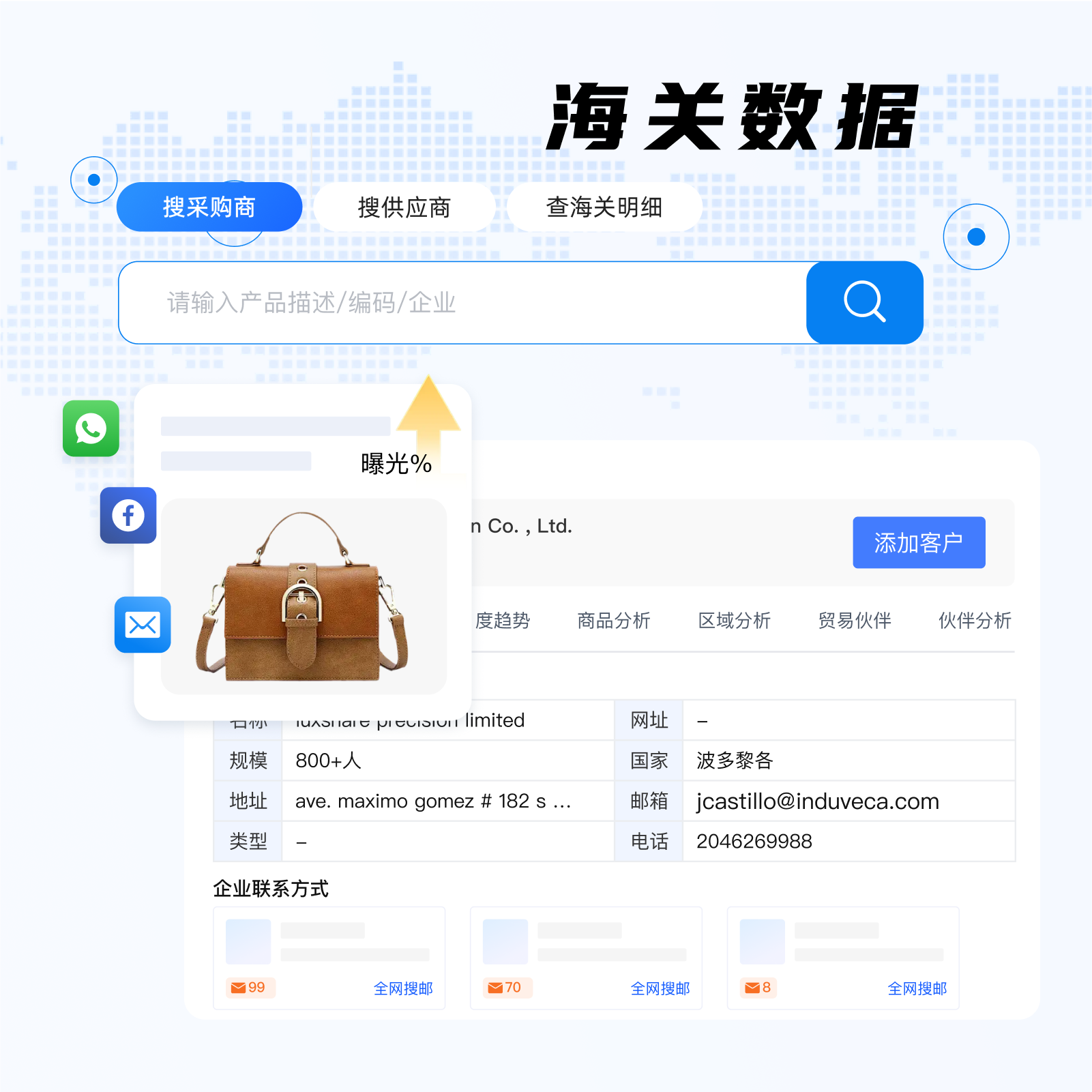 400-076-6558智领未来,外贸超级营销员
400-076-6558智领未来,外贸超级营销员
 400-076-6558智领未来,外贸超级营销员
400-076-6558智领未来,外贸超级营销员

As a novice in the foreign trade industry, you're likely eager to gain an edge in the highly competitive international market. One of the most powerful tools at your disposal is customs data. This data can provide invaluable insights that help you develop strategies, explore new markets, find potential customers, and prevent risks. In this article, we'll take a deep dive into the sources of customs data, equipping you with the knowledge to make the most of this resource.
Many countries make their customs data publicly available on their official customs websites. For example, the U.S. Customs and Border Protection website offers a wealth of import - export data. These official sources are highly reliable as they directly come from the customs authorities.
The advantage of using national customs websites is the accuracy and comprehensiveness of the data. However, the data format might be complex, and language barriers could be an issue if the website is not in a language you're familiar with. To access this data, you usually need to register on the website and follow the specific procedures provided.

Organizations like the World Trade Organization (WTO) also collect and publish customs - related data. The WTO's data covers a wide range of trade aspects, including tariffs, trade volumes, and market access. This data is useful for understanding global trade trends and comparing different countries' trade policies.
You can access WTO data through its official website. The data is presented in a relatively user - friendly format, making it easier for you to analyze and draw conclusions. It's a great resource for getting a big - picture view of the international trade landscape.
Each country's government publishes statistical reports on trade. These reports often contain detailed customs data and analysis. For instance, China's National Bureau of Statistics releases reports on China's import and export trade, including data on different industries and regions.
Government statistical reports are reliable because they are based on official records. They can provide in - depth insights into a country's trade situation, which is essential for you to understand the market environment of your target countries.
Industry associations and research institutions are another important source of customs data. They often conduct in - depth research on specific industries and compile relevant customs data. For example, the International Chamber of Commerce may have industry - specific trade data that can help you understand the market dynamics of your particular sector.
To access this data, you may need to become a member of the association or purchase research reports. The advantage of this data is its high relevance to your industry, which can give you a more targeted understanding of the market.
There are many commercial data service providers in the market that specialize in collecting, organizing, and analyzing customs data. These providers offer user - friendly platforms with advanced search and analysis tools. For example, some providers can help you filter data by product type, country, and time period, making it easier to find the information you need.
While using commercial data service providers usually requires a fee, the convenience and value - added services they offer can save you a lot of time and effort. They can also provide additional features such as competitor analysis and market forecasts.
Ports and logistics companies handle a large amount of import and export goods, so they also have access to customs - related data. This data can be particularly useful for understanding the flow of goods in and out of specific ports and regions.
Some ports may share limited data publicly, while others may require you to establish a business relationship or pay a fee to access more detailed information. The data from ports and logistics companies can help you identify potential partners and optimize your supply chain.

| Source | Advantages | Disadvantages | Access Method |
|---|---|---|---|
| National Customs Websites | High accuracy and comprehensiveness | Complex data format, possible language barriers | Register on the website and follow procedures |
| International Trade Organizations | Global perspective, user - friendly format | May lack detailed local data | Access through official website |
| Government Statistical Reports | Reliable and in - depth local data | Data may not be updated in real - time | Download from government websites |
| Industry Associations and Research Institutions | Highly relevant industry data | May require membership or purchase | Become a member or buy reports |
| Commercial Data Service Providers | Convenient access and value - added services | Require a fee | Subscribe to their services |
| Ports and Logistics Companies | Insight into goods flow in specific regions | Limited public data, may need business relationship | Establish relationship or pay for data |
In conclusion, customs data is a goldmine of information for foreign trade newbies. By leveraging different sources of customs data, you can gain a comprehensive understanding of the international market, identify business opportunities, and make informed decisions. If you're looking for a reliable and efficient way to access customs data, AB客 Customs Data can be your ideal choice. With its rich data resources, advanced search functions, and in - depth analysis tools, AB客 Customs Data can help you unlock the full potential of customs data and take your foreign trade business to the next level.
Sign up for AB客 Customs Data today and start your journey to success in the international market!
Get Started Now.png?x-oss-process=image/resize,h_100,m_lfit/format,webp)
.png?x-oss-process=image/resize,h_100,m_lfit/format,webp)

.png?x-oss-process=image/resize,h_100,m_lfit/format,webp)
.png?x-oss-process=image/resize,h_100,m_lfit/format,webp)
.png?x-oss-process=image/resize,h_100,m_lfit/format,webp)
.png?x-oss-process=image/resize,h_100,m_lfit/format,webp)
